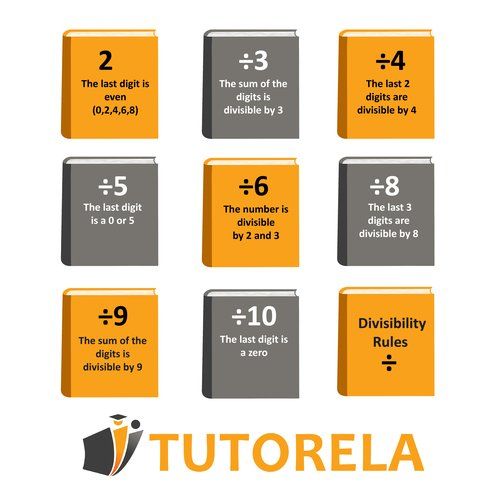A number is divisible by if the units digit is even - that is, it divides by without a remainder.
Divisibility Rules for 2, 4, and 10 Practice Problems
Master divisibility tests with step-by-step practice problems. Learn to identify numbers divisible by 2, 4, and 10 using simple tricks and patterns.
- Apply the even units digit rule to test divisibility by 2
- Use the last two digits method to check divisibility by 4
- Master the quick trick of multiplying tens digit by 2 for divisibility by 4
- Identify numbers ending in 0 as divisible by 10
- Solve real-world problems using multiple divisibility rules together
- Build speed and accuracy with mixed practice problems
Understanding Divisibility Rules for 2, 4 and 10
Divisibility Rules for 2, 4, and 10
Divisibility Criteria for 2
Divisibility Rules for 4
First way: A number is divisible by if its last two digits are divisible by .
Second way: Multiply the tens digit by and add the units digit. If the result obtained is a multiple of , then the original number is as well.
Divisibility Rules for 10
A number is divisible by if its units digit is .

Practice Divisibility Rules for 2, 4 and 10
If a number is divisible by 10, will it therefore be divisible by 4?
Examples with solutions for Divisibility Rules for 2, 4 and 10
Is the number 10 divisible by 4?
To determine if the number 10 is divisible by 4, follow these steps:
- Step 1: Perform Division
Divide 10 by 4. Calculate . - Step 2: Check Result for Integer
If , the result is not an integer. - Step 3: Confirm Remainder
Determine the remainder when 10 is divided by 4. gives a quotient of 2 and a remainder of 2. - Step 4: Conclusion on Divisibility
Since there is a remainder, 10 is not divisible by 4.
Therefore, the number 10 is not divisible by 4. The correct answer is No.
Answer:
No
Is the number 15 divisible by 2?
To determine if the number 15 is divisible by 2, we will apply the rule for divisibility by 2:
- A number is divisible by 2 if its last digit is 0, 2, 4, 6, or 8.
Now, let's follow these steps:
Step 1: Identify the last digit of the number 15. The last digit is 5.
Step 2: Compare this digit with the criteria for divisibility by 2. The digit 5 is not in the set of digits {0, 2, 4, 6, 8}.
Since the last digit of 15 is not one of the digits that makes a number divisible by 2, 15 is not divisible by 2.
Therefore, the conclusion is clear: the number 15 is not divisible by 2.
Answer:
No
Is the number 21 divisible by 4?
To determine if 21 is divisible by 4, we apply the divisibility rule for 4.
The rule states that a number is divisible by 4 if the number formed by its last two digits is divisible by 4. Since 21 only has two digits, we consider the entire number.
Checking if 21 is divisible by 4:
We calculate .
The quotient is 5 with a remainder of 1, since and .
Since there is a remainder, 21 is not divisible by 4. According to the divisibility rule, if there is any remainder other than zero, the number is not divisible.
Therefore, the correct conclusion is that 21 is not divisible by 4, and thus the number 21 is not divisible by 4.
Answer:
No
Is the number 43 divisible by 4?
To determine if the number 43 is divisible by 4, we apply the divisibility rule for 4:
- According to the rule, a number is divisible by 4 if the last two digits of the number, treated as a separate number, are divisible by 4.
- For the number 43, the last two digits are "43" itself.
- We now test if 43 is divisible by 4 by performing a simple division: .
Dividing 43 by 4 gives us:
Since 10.75 is not a whole number, 43 is not divisible by 4 without leaving a remainder.
Thus, the number 43 is not divisible by 4.
Therefore, the correct answer is No.
Answer:
No
Is the number 61 divisible by 10?
To determine if 61 is divisible by 10, we use the divisibility rule for 10:
- A number is divisible by 10 if and only if its last digit is 0.
Let's apply this rule to the number 61:
- The last digit of 61 is 1.
- Since 1 is not 0, 61 does not satisfy the divisibility rule for 10.
Therefore, we conclude that 61 is not divisible by 10.
Hence, the correct answer is: No.
Answer:
No